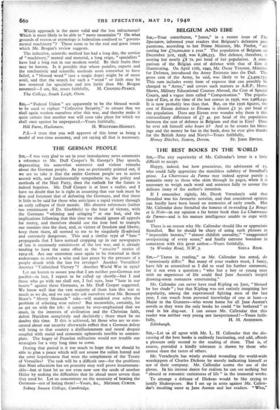THE GERMAN PEOPLE
SIR,—I was very glad to see in your introductory news comments a reference to Mr. Duff Cooper's St. George's Day speech, deprecating his somewhat extremist and violent remarks about the German people. As you so pertinently pointed out, if we are to take it that the entire German people are in active accord with, and fundamentally sympathetic to, the policy and methods of the Nazi Party, then the outlook for the future is indeed hopeless. Mr. Duff Cooper is at least a realist, and I have no doubt that he is right in assuming that our task must be first and foremost that of defeating the Germans, and that there is little to be said for those who anticipate a rapid victory through an early collapse of their morale. His abusive references (rather too reminiscent of Dr. Goebbels) to the hour of victory, with the Germans "whining and cringing" at our feet, and the implications following that this time we should ignore all appeals for mercy, and therefore should use the iron heel to trample our enemies into the dust, and, as victors of freedom and liberty, keep them there, all seemed to me to be singularly ill-advised and extremely dangerous. This and a similar type of " hate " propaganda that I have noticed cropping up in our newspapers of late is ominously reminiscent of the last war, and is already tending to have the same effect as the " atrocity " stories of 1914-18. Are our statesmen once again to be thwarted in their endeavours to evolve a wise and just peace by the pressure of a people drunk with the lust for revenge? Another Versailles? Another "Unfinished Victory"? Another World War in 1970?
Let me hasten to assure you that I am neither pro-German nor pacifist—in fact, I expect to be called up shortly—but I and those who go with me shall not, I feel sure, bear "hate in our hearts" against these Germans, as Mr. Duff Cooper suggested. We know well that the vast majority of them hate this war as much as we do, and we can only ask ourselves what Mr. Bernard Shaw's "Merry Monarch" asks—will mankind ever solve the problem of selecting wise rulers? But meanwhile, certainly, let us get on with the job: it cannot be over-emphasised that we must, in the interests of civilisation and the Christian faith, defeat Nazidom completely and decisively ; there must be no doubts this time. If this is achieved, let those who are so con- cerned about our security afterwards reflect that a German defeat will bring to that country a disillusionment and moral despair coupled with social and economic upheavals terrible to contem- plate. The bogey of Prussian militarism would not trouble our strategists for a very long time to come.
During that period is it too much to hope that we should be able to plan a peace which will not arouse the sullen hatred and the utter hopelessness that were the complement of the Treaty of Versailles? The task will be a difficult one—for the problems that Nazi education has set posterity may well prove insurmount- able—but at least let us not even now sow the seeds of another Hitler by making the difficulties that lie ahead more severe than they need be. Let us concentrate on the necessity of beating the Germans—not of hating them!—Yours, &c., MICHAEL CuRns.
Sidney Sussex College, Cambridge.






























 Previous page
Previous page